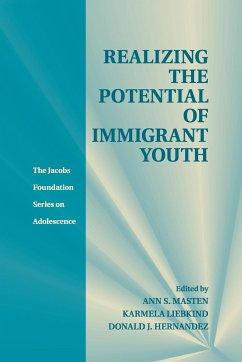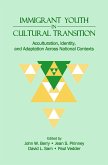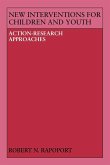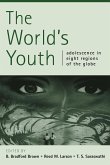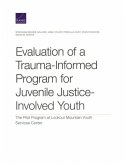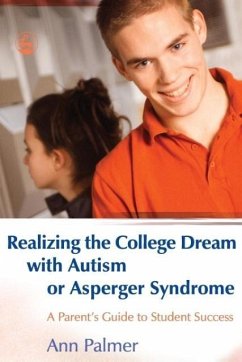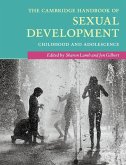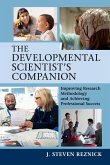Realizing the Potential of Immigrant Youth
Herausgeber: Masten, Ann S.; Hernandez, Donald J.; Liebkind, Karmela
Realizing the Potential of Immigrant Youth
Herausgeber: Masten, Ann S.; Hernandez, Donald J.; Liebkind, Karmela
- Broschiertes Buch
- Merkliste
- Auf die Merkliste
- Bewerten Bewerten
- Teilen
- Produkt teilen
- Produkterinnerung
- Produkterinnerung
This volume brings together leading scholars on immigrant youth to discuss current research and its implications for policy and intervention.
Andere Kunden interessierten sich auch für
![Immigrant Youth in Cultural Transition Immigrant Youth in Cultural Transition]() Immigrant Youth in Cultural Transition76,99 €
Immigrant Youth in Cultural Transition76,99 €![New Interventions for Children and Youth New Interventions for Children and Youth]() Robert Norman RapoportNew Interventions for Children and Youth37,99 €
Robert Norman RapoportNew Interventions for Children and Youth37,99 €![The World's Youth The World's Youth]() B. Bradford BrownThe World's Youth50,99 €
B. Bradford BrownThe World's Youth50,99 €![Evaluation of a Trauma-Informed Program for Juvenile Justice-Involved Youth Evaluation of a Trauma-Informed Program for Juvenile Justice-Involved Youth]() Stephanie Brooks HollidayEvaluation of a Trauma-Informed Program for Juvenile Justice-Involved Youth26,99 €
Stephanie Brooks HollidayEvaluation of a Trauma-Informed Program for Juvenile Justice-Involved Youth26,99 €![Realizing the College Dream with Autism or Asperger Syndrome Realizing the College Dream with Autism or Asperger Syndrome]() Ann PalmerRealizing the College Dream with Autism or Asperger Syndrome23,99 €
Ann PalmerRealizing the College Dream with Autism or Asperger Syndrome23,99 €![The Cambridge Handbook of Sexual Development The Cambridge Handbook of Sexual Development]() The Cambridge Handbook of Sexual Development59,99 €
The Cambridge Handbook of Sexual Development59,99 €![The Developmental Scientist's Companion The Developmental Scientist's Companion]() J. Steven ReznickThe Developmental Scientist's Companion31,99 €
J. Steven ReznickThe Developmental Scientist's Companion31,99 €-
-
-
This volume brings together leading scholars on immigrant youth to discuss current research and its implications for policy and intervention.
Hinweis: Dieser Artikel kann nur an eine deutsche Lieferadresse ausgeliefert werden.
Hinweis: Dieser Artikel kann nur an eine deutsche Lieferadresse ausgeliefert werden.
Produktdetails
- Produktdetails
- Verlag: Cambridge University Press
- Seitenzahl: 464
- Erscheinungstermin: 29. Juni 2015
- Englisch
- Abmessung: 229mm x 152mm x 27mm
- Gewicht: 748g
- ISBN-13: 9781316500927
- ISBN-10: 1316500926
- Artikelnr.: 44029987
- Herstellerkennzeichnung
- Libri GmbH
- Europaallee 1
- 36244 Bad Hersfeld
- gpsr@libri.de
- Verlag: Cambridge University Press
- Seitenzahl: 464
- Erscheinungstermin: 29. Juni 2015
- Englisch
- Abmessung: 229mm x 152mm x 27mm
- Gewicht: 748g
- ISBN-13: 9781316500927
- ISBN-10: 1316500926
- Artikelnr.: 44029987
- Herstellerkennzeichnung
- Libri GmbH
- Europaallee 1
- 36244 Bad Hersfeld
- gpsr@libri.de
Introduction Ann S. Masten, Karmela Liebkind and Donald J. Hernandez; 1.
Resources, strengths, and challenges for children in immigrant families in
eight affluent countries Donald J. Hernandez; 2. Better fortunes? Living
arrangements and school enrolment of migrant youth in six western countries
Audrey N. Beck and Marta Tienda; 3. Income poverty and income support for
minority and immigrant households with children in rich countries Timothy
S. Smeeding, Karen Robson, Cody Wing and Jonathan Gershuny; 4. Age at
immigration and the education outcomes of children Miles Corak; 5. Positive
immigrant youth adaptation in context: developmental, acculturation and
social psychological perspectives Frosso Motti-Stefanidi, John Berry, Xenia
Chryssochoou, David Lackland Sam and Jean Phinney; 6. Understanding the
immigrant paradox in youth: developmental and contextual considerations
Cynthia Garcia Coll, Flannery Patton, Amy Marks, Radosveta Dimitrova, Rui
Yang, Gloria A. Suarez and Andrea Patrico; 7. The contributions of youth to
immigrant families Andrew J. Fuligni and Eva H. Telzer; 8. Specifying
social psychological adaptation of immigrant youth: social identity,
intergroup attitudes and intergroup interactions Karmela Liebkind, Inga
Jasinkskaja-Lahti and Tuuli Anna Mahonen; 9. Understanding ethnic minority
identity Maykel Verkuyten; 10. Muslim, American, and immigrant: integration
despite challenges Selcuk R. Sirin and Taveeshi Gupta; 11.
Autonomous-related self and competence: the potential of immigrant youth
Cigdem Kagitcibasi; 12. Thriving among immigrant youth: theoretical and
empirical bases of positive development Richard M. Lerner, Jacqueline V.
Lerner, Edmond Bowers and Selve Lewin-Bizan; 13. The role of developmental
transitions in psychosocial competence: a comparison of native and
immigrant young people in Germany Rainer K. Silbereisen, Peter F. Titzmann,
Andrea Michel, Avi Sagi-Schwartz and Yoav Lavee; 14. Conceptualizing the
school acculturative context: school, classroom, and the immigrant student
Gabriel Horenczyk and Moshe Tatar; 15. Peer relations in multicultural
school Christiane Spiel and Dagmar Strohmier; 16. Latino education in the
United States: immigration, language, and achievement Eugene E. Garcia; 17.
Promoting the well-being of immigrant youth: a framework for comparing
outcomes and policies Brian Nolan.
Resources, strengths, and challenges for children in immigrant families in
eight affluent countries Donald J. Hernandez; 2. Better fortunes? Living
arrangements and school enrolment of migrant youth in six western countries
Audrey N. Beck and Marta Tienda; 3. Income poverty and income support for
minority and immigrant households with children in rich countries Timothy
S. Smeeding, Karen Robson, Cody Wing and Jonathan Gershuny; 4. Age at
immigration and the education outcomes of children Miles Corak; 5. Positive
immigrant youth adaptation in context: developmental, acculturation and
social psychological perspectives Frosso Motti-Stefanidi, John Berry, Xenia
Chryssochoou, David Lackland Sam and Jean Phinney; 6. Understanding the
immigrant paradox in youth: developmental and contextual considerations
Cynthia Garcia Coll, Flannery Patton, Amy Marks, Radosveta Dimitrova, Rui
Yang, Gloria A. Suarez and Andrea Patrico; 7. The contributions of youth to
immigrant families Andrew J. Fuligni and Eva H. Telzer; 8. Specifying
social psychological adaptation of immigrant youth: social identity,
intergroup attitudes and intergroup interactions Karmela Liebkind, Inga
Jasinkskaja-Lahti and Tuuli Anna Mahonen; 9. Understanding ethnic minority
identity Maykel Verkuyten; 10. Muslim, American, and immigrant: integration
despite challenges Selcuk R. Sirin and Taveeshi Gupta; 11.
Autonomous-related self and competence: the potential of immigrant youth
Cigdem Kagitcibasi; 12. Thriving among immigrant youth: theoretical and
empirical bases of positive development Richard M. Lerner, Jacqueline V.
Lerner, Edmond Bowers and Selve Lewin-Bizan; 13. The role of developmental
transitions in psychosocial competence: a comparison of native and
immigrant young people in Germany Rainer K. Silbereisen, Peter F. Titzmann,
Andrea Michel, Avi Sagi-Schwartz and Yoav Lavee; 14. Conceptualizing the
school acculturative context: school, classroom, and the immigrant student
Gabriel Horenczyk and Moshe Tatar; 15. Peer relations in multicultural
school Christiane Spiel and Dagmar Strohmier; 16. Latino education in the
United States: immigration, language, and achievement Eugene E. Garcia; 17.
Promoting the well-being of immigrant youth: a framework for comparing
outcomes and policies Brian Nolan.
Introduction Ann S. Masten, Karmela Liebkind and Donald J. Hernandez; 1.
Resources, strengths, and challenges for children in immigrant families in
eight affluent countries Donald J. Hernandez; 2. Better fortunes? Living
arrangements and school enrolment of migrant youth in six western countries
Audrey N. Beck and Marta Tienda; 3. Income poverty and income support for
minority and immigrant households with children in rich countries Timothy
S. Smeeding, Karen Robson, Cody Wing and Jonathan Gershuny; 4. Age at
immigration and the education outcomes of children Miles Corak; 5. Positive
immigrant youth adaptation in context: developmental, acculturation and
social psychological perspectives Frosso Motti-Stefanidi, John Berry, Xenia
Chryssochoou, David Lackland Sam and Jean Phinney; 6. Understanding the
immigrant paradox in youth: developmental and contextual considerations
Cynthia Garcia Coll, Flannery Patton, Amy Marks, Radosveta Dimitrova, Rui
Yang, Gloria A. Suarez and Andrea Patrico; 7. The contributions of youth to
immigrant families Andrew J. Fuligni and Eva H. Telzer; 8. Specifying
social psychological adaptation of immigrant youth: social identity,
intergroup attitudes and intergroup interactions Karmela Liebkind, Inga
Jasinkskaja-Lahti and Tuuli Anna Mahonen; 9. Understanding ethnic minority
identity Maykel Verkuyten; 10. Muslim, American, and immigrant: integration
despite challenges Selcuk R. Sirin and Taveeshi Gupta; 11.
Autonomous-related self and competence: the potential of immigrant youth
Cigdem Kagitcibasi; 12. Thriving among immigrant youth: theoretical and
empirical bases of positive development Richard M. Lerner, Jacqueline V.
Lerner, Edmond Bowers and Selve Lewin-Bizan; 13. The role of developmental
transitions in psychosocial competence: a comparison of native and
immigrant young people in Germany Rainer K. Silbereisen, Peter F. Titzmann,
Andrea Michel, Avi Sagi-Schwartz and Yoav Lavee; 14. Conceptualizing the
school acculturative context: school, classroom, and the immigrant student
Gabriel Horenczyk and Moshe Tatar; 15. Peer relations in multicultural
school Christiane Spiel and Dagmar Strohmier; 16. Latino education in the
United States: immigration, language, and achievement Eugene E. Garcia; 17.
Promoting the well-being of immigrant youth: a framework for comparing
outcomes and policies Brian Nolan.
Resources, strengths, and challenges for children in immigrant families in
eight affluent countries Donald J. Hernandez; 2. Better fortunes? Living
arrangements and school enrolment of migrant youth in six western countries
Audrey N. Beck and Marta Tienda; 3. Income poverty and income support for
minority and immigrant households with children in rich countries Timothy
S. Smeeding, Karen Robson, Cody Wing and Jonathan Gershuny; 4. Age at
immigration and the education outcomes of children Miles Corak; 5. Positive
immigrant youth adaptation in context: developmental, acculturation and
social psychological perspectives Frosso Motti-Stefanidi, John Berry, Xenia
Chryssochoou, David Lackland Sam and Jean Phinney; 6. Understanding the
immigrant paradox in youth: developmental and contextual considerations
Cynthia Garcia Coll, Flannery Patton, Amy Marks, Radosveta Dimitrova, Rui
Yang, Gloria A. Suarez and Andrea Patrico; 7. The contributions of youth to
immigrant families Andrew J. Fuligni and Eva H. Telzer; 8. Specifying
social psychological adaptation of immigrant youth: social identity,
intergroup attitudes and intergroup interactions Karmela Liebkind, Inga
Jasinkskaja-Lahti and Tuuli Anna Mahonen; 9. Understanding ethnic minority
identity Maykel Verkuyten; 10. Muslim, American, and immigrant: integration
despite challenges Selcuk R. Sirin and Taveeshi Gupta; 11.
Autonomous-related self and competence: the potential of immigrant youth
Cigdem Kagitcibasi; 12. Thriving among immigrant youth: theoretical and
empirical bases of positive development Richard M. Lerner, Jacqueline V.
Lerner, Edmond Bowers and Selve Lewin-Bizan; 13. The role of developmental
transitions in psychosocial competence: a comparison of native and
immigrant young people in Germany Rainer K. Silbereisen, Peter F. Titzmann,
Andrea Michel, Avi Sagi-Schwartz and Yoav Lavee; 14. Conceptualizing the
school acculturative context: school, classroom, and the immigrant student
Gabriel Horenczyk and Moshe Tatar; 15. Peer relations in multicultural
school Christiane Spiel and Dagmar Strohmier; 16. Latino education in the
United States: immigration, language, and achievement Eugene E. Garcia; 17.
Promoting the well-being of immigrant youth: a framework for comparing
outcomes and policies Brian Nolan.

